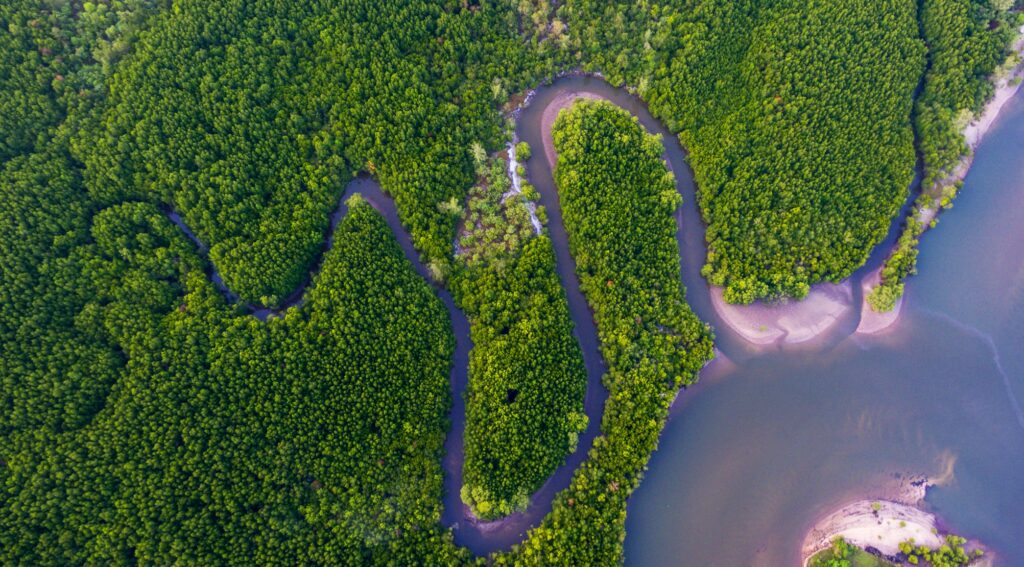The kick-off of the Finance for Nature Virtual Global Series on 20 & 21 July brought together industry champions from finance, insurance, consumer goods companies, and standard-setting regulators, to tackle two questions on how to accelerate nature-friendly finance: (1) Why should nature be positioned at the heart of the finance and green recovery agenda? (2) How can private capital and corporations unlock nature’s potential to achieve impact for the planet and prosperity for its people? Key takeaways from the series include:
- The financial sector is increasingly well informed on the impact of climate, but less so about how to account for biodiversity and nature in its portfolio. Industry champions called for the inclusion of nature and biodiversity loss, as climate change cannot be fully addressed without it.
- To move beyond the individual asset-based disclosure requirements, a framework for more systemic nature-related risk disclosure is needed, following the trajectory of mandatory climate disclosure.
- The finance community needs a greater focus on traceability of corporate supply chains around climate, deforestation and other nature-related issues. It also needs to build in systems of accountability such as standards, or certifications (e.g. RSPO for palm oil).
“What’s the point of my pension fund if it contributes to a dead planet? We’ll finance ourselves into extinction. We need to put the ‘eco’ back in ‘economy”
Andrew Mitchell , Global Canopy
Why should nature be positioned at the heart of the finance and green recovery agenda?
Susan Gardner, Director of the Ecosystems Division at UNEP and Omar Shaikh, Founder of the Global Ethical Finance Initiative expressed the urgent need to move nature further up on the finance agenda and to play a core role as part of the green recovery. And the audience agreed, with 87% of respondents to the live poll noting that their organizations consider climate and nature as interconnected in the context of investing. Further, when asked if they have a policy in place that integrates nature-based solutions into decision-making, 52% said Yes, 28% plan to have a policy in the future, and 21% do not have a policy.
Inger Adersen, Executive Director of the UN Environment Programme (UNEP), provided the opening keynote address, highlighting that the Covid-19 pandemic provides a stark reminder of human’s reliance on nature, particularly for health. About half of the world’s GDP is directly or indirectly reliant on nature, and the finance sector’s recognition of the physical risks posed by the destruction of nature is a positive step but more urgent action must be taken. Inger urged governments and the private sector to use the UNFCCC COP26 in November 2021 as a target to steer economies towards a green transition that maximizes growth, employment and resilience.
UNDP Administrator, Achim Steiner, stressed the importance of nature for sustainable and equitable development and recovery from Covid-19, noting that 2.5 billion people depend on nature. Failure to seize the opportunity to place nature firmly on the green recovery agenda could lead to delayed progress by up to 10 years and failure to achieve the Sustainable Development Goals (SDGs). Accelerating decision-making and delivering impact at scale will require rebalancing the economic system with incentives and frameworks to ensure nature is not a marginal consideration operating in a parallel economy but a valuable asset that is understood, measured and incorporated into transformational policy strategies.
De Nederlandsche Bank recently published its ‘Indebted to Nature’ report which highlights the Dutch financial sector’s exposure to risks from biodiversity loss. The report estimates that Dutch financial institutions have over €500 billion in exposure to companies with high or very high dependence on ecosystem services, or approximately 36% of the examined portfolio. Executive Director of De Nederlandsche Bank, Olaf Sleijpen, stressed that although the world is in the midst of global health and economic crisis we cannot lose sight of the threat posed by climate change and biodiversity loss. The current situation presents a unique opportunity to take steps towards creating a carbon neutral economy. Olaf called on other central banks to build on the approach taken in the Netherlands to further explore and develop best practice to enable financial services to catalyse change and to promote consistent standards and frameworks for biodiversity risk measuring and reporting.
“Biodiversity and nature loss pose major economic, social and environmental threats that we cannot afford to ignore.”
Olaf Sleijpen , DNB
The audience also heard from an expert panel, moderated by UNDP’s Head of Climate Promise, Cassie Flynn, with representatives from the banking sector, insurance, asset managers, and leading thinkers on sustainable investing. Speakers included, Philippe Zaouati, CEO of Mirova; Brooke Barton, Vice President of Innovation and Evaluation at Ceres; Stephen Hibbert, Managing Director at ING; Veronica Scotti, Chairperson Public Sector Solutions at Swiss Re; and Diandra Soobiah, Head of Responsible Investment at Nest Pensions. The keynote speakers outlined a vision for a nature-forward future and panelists discussed the key practical solutions needed to position nature in the finance agenda.
Firstly, as we have now reached a tipping point where the impacts of deforestation and climate change may be irreversible, deforestation must be recognised as a risk that is embedded across commodities, asset classes and industries. Ceres presented the Investor Guide to Deforestation and Climate Change: a tool which provides timely guidance for financial institutions to divest from deforestation and to engage with their portfolio.
Secondly, there is a need to build robust impact measurement indicators that could address the complexities in measuring biodiversity. Mirova is currently joining forces with other partners to develop a tool that includes impact measurement on biodiversity for listed companies, which could help reduce the risk of greenwashing in the industry.
Thirdly, coordinated efforts across asset classes will be essential to improve the existing toolkits and develop new methodologies, metrics and taxonomies to integrate nature into financial decision-making. As noted by Swiss RE, insurers have a key role to play in leading this movement: they understand risk and invest in the long term, so they are well placed to embrace finance for nature. Building from the TCFD experience for climate, ING highlighted that this collective effort for nature also needs to involve actors from the scientific and data communities, who can support the financial sector to address this challenge with greater confidence. Civil society and global investor movements are already calling asset owners to redirect finance flows to nature-friendly investments. Among them, NEST Pensions supports the Make My Money Matter campaign that is calling on pension providers to think of the planet and its people alongside making a profit.
Audience Q&A topics:
- Best practice in communicating effectively with customers
- Obstacles to achieving a pipeline of investable projects
- The role of central banks in the green recovery
- Ensuring that no one is left behind through the protection and creation of livelihoods.
How can private capital and corporations unlock nature’s potential to achieve impact for planet and prosperity?
The second day of the series focused on the financial risk of biodiversity loss and the role of the private sector to take action. Midori Paxton, Head of Ecosystems and Biodiversity at UNDP and Andrew Mitchell of Natural Capital Finance Alliance and Global Canopy facilitated the discussion. Elizabeth Mrema, Executive Secretary of the Convention on Biological Diversity (CBD), opened the session with an uplifting reminder that 2020 is still the ‘Super Year’ for nature. Now is the time to reassess human’s relationship with nature and to recognize that nature is a public good which has been over-exploited. $44 trillion of economic activity is largely dependent on nature, providing the economic case for increasing nature-friendly finance and since the private financial sector is a critical enabler of markets it can contribute positively to halting biodiversity loss. Ms. Mrema urged the financial sector to ensure that financial disclosure initiatives contribute to the 2030 Biodiversity Framework to protect 30% of earth’s lands and seas.
A new reporting framework called the Task Force for Nature-related Financial Risk Disclosure (TNFD) was announced by Minister Zac Goldsmith, UK Minister of State for the Pacific, International Environment, Climate and Forests, and Animal Welfare. Ten financial institutions, the World Business Council For Sustainable Development and the UK and Swiss governments have backed the initiative, supported by UNDP, UNEP, Global Canopy, and WWF. It aims to increase financial flows at scale towards nature-positive investment and lending opportunities to allow people and the planet to flourish. In an audience poll, 89% of participants voted ‘Yes’ that disclosure of nature-related risk can drive real change and is not just a mere box-ticking exercise.
“The pandemic is one symptom of our dysfunctional relationship with the natural world and we need to reset the relationship with nature.”
Zac Goldsmith, UK
The expert panel included industry champions from private financial institutions like banks and insurance, and experts in private sector nature-related risk disclosure, including, Adam Kanzer, Head of Stewardship at BNP Paribas; Sonja Gibbs, Sustainable Finance Working Group at the Institute of International Finance (IIF); Mark Kenber, Managing Director at Climate Advisers; Rowan Douglas, Head of Capital Science & Policy Practice at Willis Towers Watson; and Bas Rüter, Director of Sustainability at Rabobank.
The three leading experts from the financial sector - BNP Paribas, Willis Towers Watson, and Rabobank - shared their insights on a private sector perspective of nature-related risk. They recognize the role of increased accountability to drive action and noted the role of government to provide the necessary enabling conditions but also of banks to fulfill their obligation to deliver valuable, long-term investments to clients and investing in nature is a valuable, long-term investment. They urged that climate risk disclosure should go further to account for nature as a climate change adaptation, not just mitigation. For example, Willis Towers Watson noted the importance of accounting for the physical risk of coral reefs or mangroves degradation which protect coastal communities and ecosystems from storm surges. When this risk is valued, there is much higher incentive to address it and prevent it.
“The risk the world faces is not just biodiversity loss but the collapse of nature all together...We cannot preserve shareholder value without preserving nature and biodiversity.”
Adam Kanzer , BNP Paribas
Deforestation is a major threat to biodiversity loss, mainly driven by cleared land for industrial agriculture and urgent action is needed to divest from deforestation. Banks have a role to play by providing the right incentives working with companies to create a better market price for sustainably-produced goods. One example is Rabobank’s efforts to offer lower interest rates for sustainable production in Brazil, where deforestation rates are high. Direct engagement with clients to ensure soft commodity supply chains are nature and climate-friendly, through a regional approach that fits the local context, is an impactful way investors can take action. However, there is a gap in knowledge on deforestation in supply chains - few investors are aware of the deforestation risk in their investment portfolio and the financial cost of that risk is high.
According to Orbitas Finance, presented by Climate Advisers, 44 financial institutions each have over $300million invested in palm oil alone and investors in 13 companies have at least $23 billion at risk. Orbitas provides a tool to assess deforestation risk in investor portfolios. Other related resources for assessing supply chain natural capital risk, noted throughout the series include: Encore and Gist Impact. A trend towards increased supply chain transparency, where companies are required to show where their assets are located, is helping to put pressure on companies to take action. Willis Towers Watson noted that the emerging use of spatial data to assess financial risk can help accelerate that pressure. Other examples of financial products and investor actions, as noted by IIF include, social bonds, debt for nature swaps, and biodiversity offsets and all rely on proactive and consistent measurement and reporting of risk. Ultimately, to account for nature loss, a collaborative and common approach to natural capital risk reporting and disclosure is needed and panelists underscored that a nature-related financial disclosure system like TNFD is a promising step. Just as the climate change financial risk task force helped channel private sector behavior through the TCFD overarching framework, this is what is needed for nature, and it must use the TCFD momentum.
“Nature to be embedded into classic macroeconomic analysis...[We need] a nature-equivalent of scope 3 emissions for climate, e.g. ‘scope 3 depletions’”
Sonia Gibbs, IIF
Audience Q&A topics included:
- the methodologies for putting an economic value on nature assets and potential externalities
- the gaps in understanding nature-related risk and implementing actions to avoid it
- the role of governments to regulate nature-related risk
Finally, Nigel Topping, UK High-Level Climate Action Champion, expressed hope for a nature-related financial risk disclosure platform as the next big step for finance and invited the audience to join the Race to Zero November Dialogues, where discussions about finance for nature will continue and hopes that these discussions will influence positive outcomes for finance for nature at the UNFCCC COP 26 in November 2021.
The two inaugural sessions of the Finance for Nature Virtual Global Series laid the groundwork for future discussions that aim to advance the integration of nature-related risks and considerations in the international financial policy and regulatory agenda. Covid-19 presents a unique opportunity to build back an economy that repairs our relationship with nature and addresses biodiversity. The evidence is clear - $3.6 trillion in business opportunities from sustainable food, land and ocean use, representing 191 million new jobs over the next 10 years, and more than half the world’s GDP and 2.5 billion people depend on nature - Nature-friendly investments must be scaled up to protect people, planet, and prosperity and to ensure a green economic recovery.
You can view the full event report and recordings from the sessions on the event web page here.
About The Finance for Nature Virtual Global Series: Designed as a series of high-level, quarterly, virtual dialogues leading up to COP26, the Global Series will look to advance the integration of nature-related risks and considerations in the international financial policy and regulatory agenda. It brings together industry champions from finance, insurance, consumer goods companies, and standard-setting regulators, and aims to drive practical commitments on investing in nature. This series is organised by UNDP, UNEP, the Scottish Government backed-Global Ethical Finance Initiative, Climate Advisers and partners of the New York Declaration on Forests.



